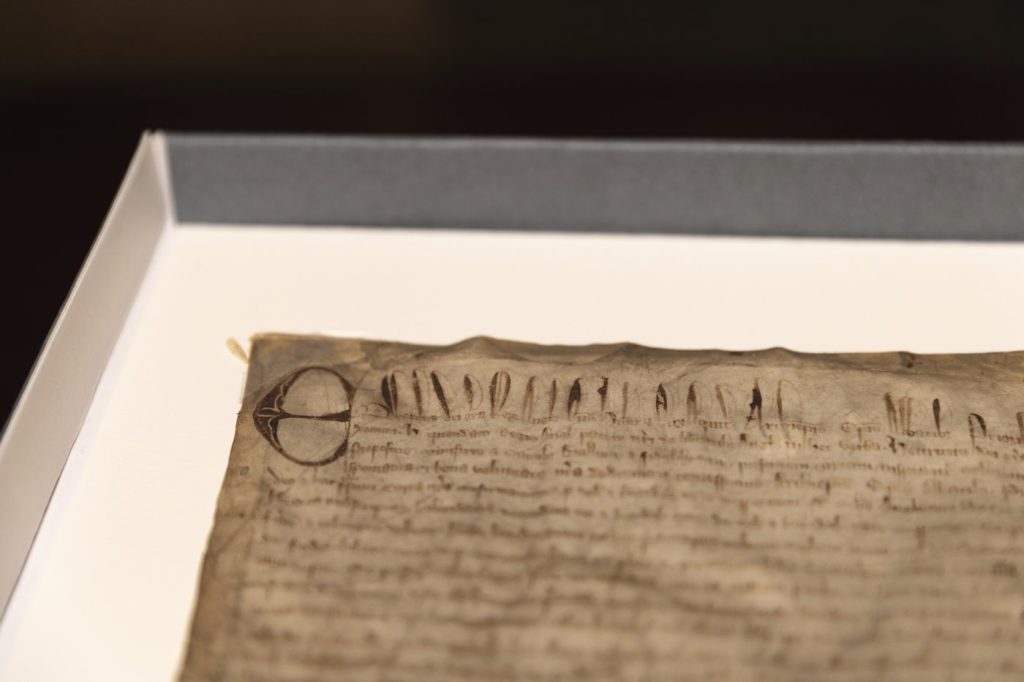BOSTON (AP) — For many years, Harvard University believed it possessed a inexpensive replica of the Magna Carta, an old and deteriorating document acquired for less than $30. However, two researchers have determined the document might actually be a rare original version from 1300, issued by King Edward I of England.
The original Magna Carta, established in 1215, laid down the critical principle that the king is not above the law, serving as a foundation for many legal systems worldwide. Traditionally, it has been accepted that there are only four original copies along with six copies from the 1300 version of the document.
David Carpenter, a professor of medieval history at King’s College London, expressed his astonishment after discovering the document on the Harvard Law School Library website in December 2023. “My reaction was one of amazement and, in a way, awe that I should have managed to find a previously unknown Magna Carta," Carpenter noted. He realized the historical significance of the document and was shocked that Harvard had overlooked its value for so long.
To authenticate the document, Carpenter collaborated with Nicholas Vincent, a professor of medieval history from the University of East Anglia in Britain. The pair conducted a thorough examination, comparing Harvard's document to the authentic copies from 1300. They utilized advanced technology, such as ultraviolet light and spectral imaging, to uncover details invisible to the naked eye, enabling them to analyze the text and handwriting meticulously.
The 1300 edition of the Magna Carta features various distinct changes from its predecessors, which Carpenter pointed out occurs in every known copy of that version. Despite its worn appearance, the document passed all authenticity tests with “flying colors,” as Carpenter described, and is now estimated to be worth millions of dollars, although Harvard has no inclination to sell it.
Investigating the document's historical journey, Vincent traced it back to the former parliamentary borough of Appleby in Westmorland, England. In 1946, the Harvard Law School Library bought the document for just $27.50, incorrectly dated to 1327 at the time of purchase. Vincent discovered that the document was auctioned in 1945 by Forster Maynard, a World War I aviator who contributed to the defense of Malta during World War II. Maynard inherited the archives from the Clarksons, notable abolitionists who campaigned against the slave trade, linking the document back to a historical narrative involving influential figures of that era.
Even though there is no concrete proof showing this was the Appleby Magna Carta, Vincent expressed a strong belief that it is likely the same document, commenting on the circumstantial evidence linking it to Thomas Clarkson, a key figure in the campaign against slavery.
Vincent and Carpenter have scheduled a visit to Harvard in June to examine the Magna Carta directly. They assert that the document is particularly relevant today, especially as Harvard faces conflict with the Trump administration concerning the scope of federal authority over private institutions regarding key matters such as governance, admissions, and activism on campus.
As interest in the Magna Carta is reignited, the document serves as a powerful teaching tool about the principles of individual liberty and self-governance, essential lessons that many modern audiences can draw upon. Amanda Watson, assistant dean for library and information services at Harvard Law School, reflected on the potential impact this discovery could have for educating new generations about democracy and the historical context underpinning today’s legal systems.
Overall, the unexpected revelation of Harvard's rare Magna Carta copy not only enhances the institution's historical collection but also underscores the lasting importance of the document in advocating for individual rights and democratic principles.










